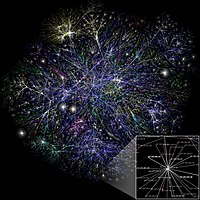
Photo from wikipedia
Online Social Networks (OSNs) are a popular platform for communication and collaboration. Spammers are highly active in OSNs. Uncovering spammers has become one of the most challenging problems in OSNs.… Click to show full abstract
Online Social Networks (OSNs) are a popular platform for communication and collaboration. Spammers are highly active in OSNs. Uncovering spammers has become one of the most challenging problems in OSNs. Classification-based supervised approaches are the most commonly used method for detecting spammers. Classification-based systems suffer from limitations of “data labelling”, “spam drift”, “imbalanced datasets” and “data fabrication”. These limitations effect the accuracy of a classifier’s detection. An unsupervised approach does not require labelled datasets. We aim to address the limitation of data labelling and spam drifting through an unsupervised approach.We present a pure unsupervised approach for spammer detection based on the peer acceptance of a user in a social network to distinguish spammers from genuine users. The peer acceptance of a user to another user is calculated based on common shared interests over multiple shared topics between the two users. The main contribution of this paper is the introduction of a pure unsupervised spammer detection approach based on users’ peer acceptance. Our approach does not require labelled training datasets. While it does not better the accuracy of supervised classification-based approaches, our approach has become a successful alternative for traditional classifiers for spam detection by achieving an accuracy of 96.9%.
Journal Title: Journal of Big Data
Year Published: 2022
Link to full text (if available)
Share on Social Media: Sign Up to like & get
recommendations!